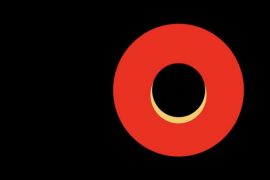WHEN I WAS A KID MY FATHER AND I WOULD GO ON WALKS INTO THE NIGHT of our suburban neighborhood and look up at the sky. Surrounded by oak trees and the occasional redwood, with the lights turned off in every home, the evenings were melted and quiet. You could still see the stars above us. They were glittering rocks.
My father would point out the constellations and planets to me, his large tanned hand pointing upward, my small head following its direction. He’d say things like, the closest star is four point twenty-two light years away, and then he’d tell me I was made of dead stars, and so was he, and so was everyone else. He’d say things like, if I was standing on the edge of a black hole, and I was looking back at you here on Earth, you’d see time pass quickly. You’d see me scream and wave my arms, then you’d see the skin fall off my body, then you’d see my bones turn to ash, then I’d be gone.
I listened quietly. I wanted him to believe that I, too, was interested in the physics and mechanical workings of outer space. Really, I was just interested in him and the way that he knew something about everything, had an answer for all my questions, told the stories about lonely astronauts and the frozen planets of our solar system with such a poeticism it made me tear up. He was a little boy when man first walked on the moon, and he watched it on television with his own eyes. That, he told me, was the moment he realized he wanted to build something, to get somewhere. My father was an engineer. He believed everything was simply a matter of equations.
I asked how long it would take us to get to Mars. He said almost a year, and then he looked up and rubbed his temples. What I really meant to ask him was, what will happen to me in a year. What will happen to me when I die. What I really meant to ask him was, when will you go to Mars, because my father knew something about everything and I thought he would go. What I really meant to ask was, would you bring me with you.
What about aliens, I asked him, what about when they come for us? And as we rounded the curved corner of my street and walked toward our house, he told me that maybe somewhere, on another planet far away, there was a father and his kid looking up at our own Earth, asking the same questions. I imagined a green lizard family staring at me as I looked up. I wished desperately to send a message to them, to tell them I was there.
When my father was gone, when there were no more redwood trees and the suburban streets had two-hour parking, when my neighborhood was no longer a neighborhood but a bustling city of tech workers and engineers, the next generation after my father, when no one could see the stars anymore, I still wondered about the other planet. I wondered if the alien and his child still looked up at us somewhere. I wondered if time had passed slowly or quickly, if they had disintegrated into bones and ash and nothingness, particles disappearing into the cosmos, or if they still stood where I’d imagined them all those years ago, holding hands, unmoved, standing on the sidewalk on a quiet suburban night.
KAYLIE SAIDIN grew up in the San Francisco Bay Area and now lives in New Orleans. This fall, she will enter in the MFA program at the University of North Carolina Wilmington. Her work has appeared or is forthcoming in Catamaran Literary Reader, upstreet #15, Atlas & Alice, and elsewhere.
Like what you’re reading?
Get new stories or poetry sent to your inbox. Drop your email below to start >>>
OR grab a print issue
Stories, poems and essays in a beautifully designed magazine you can hold in your hands.
GO TO ISSUESNEW book release
We’re thrilled to release our first novel into the world. Alligator Zoo-Park Magic by C.H. Hooks has been called “A new spin on the mystical, mythical south.”
GET THE BOOK


